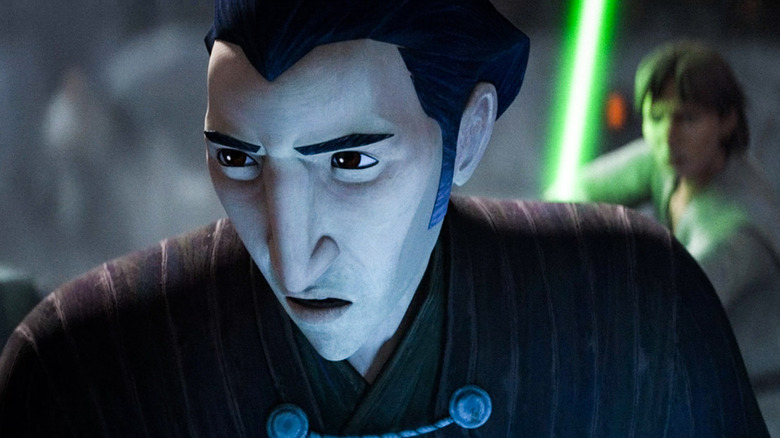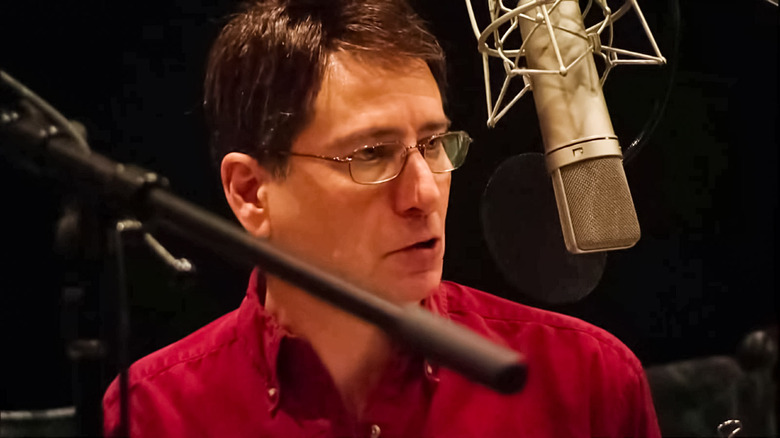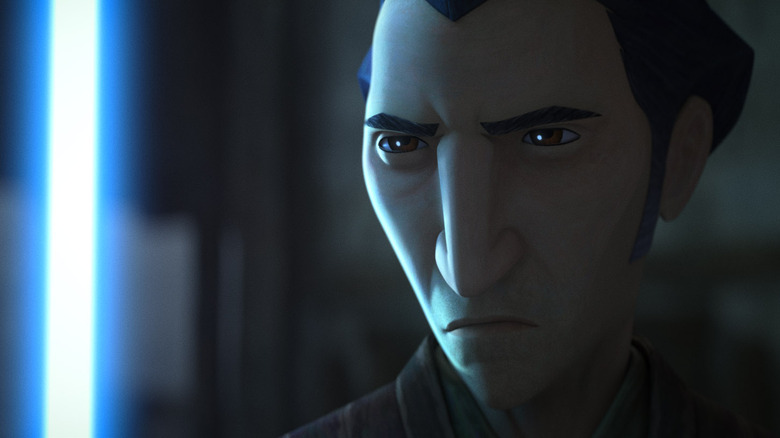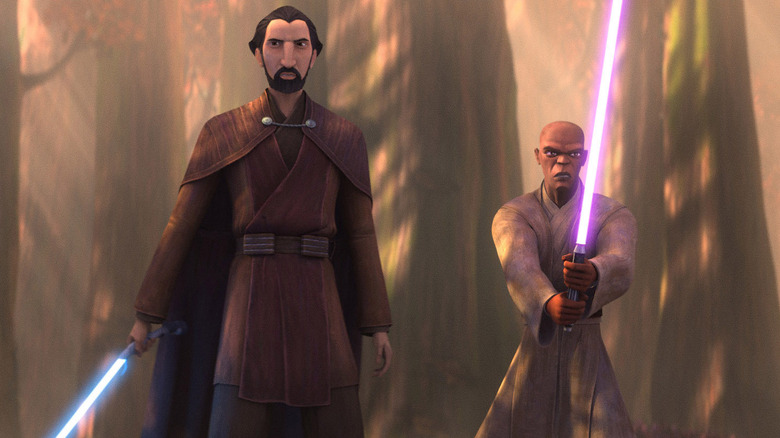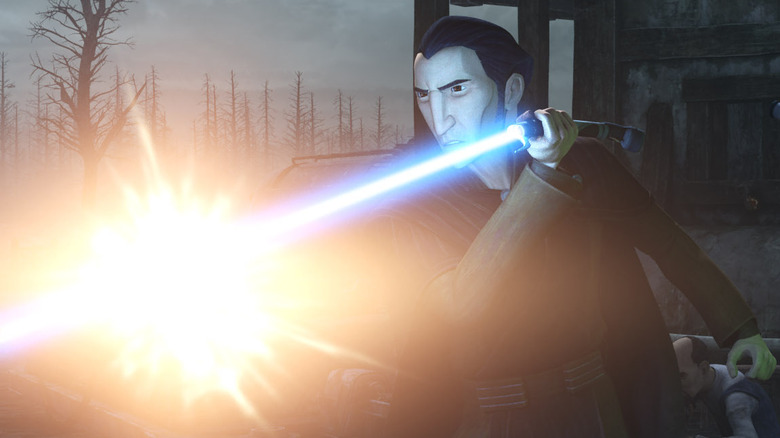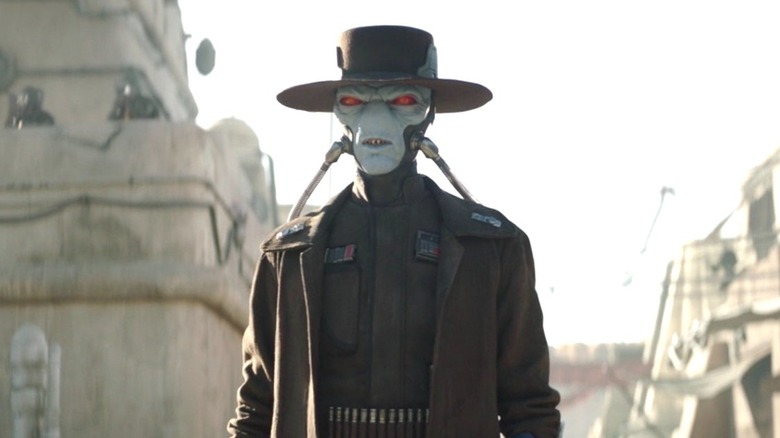How Corey Burton De-Aged Count Dooku's Voice For Star Wars: Tales Of The Jedi [Exclusive Interview]
The new animated anthology miniseries "Star Wars: Tales of the Jedi" is now streaming on Disney+, and brings us a new perspective on Count Dooku: a view of him in his earlier years before the corruption of the Sith took him and twisted him into Darth Tyranus.
The man behind Count Dooku's voice, Corey Burton, has been a voice actor for decades, providing voices you hear almost every day. From the tram operator at Disneyland and "Star Wars" characters like Count Dooku and Cad Bane, all the way to Captain Hook, Spike Witwicky and Shockwave from "Transformers," and even James Bond, Jr., Burton has shaped the audio landscape of Saturday morning cartoons and theme parks for decades. We were able to have a wide-ranging conversation with him about the beginnings of his career, his work as Count Dooku, and the legacy of "Star Wars."
'Who is that?'
I'm a huge fan of the Haunted Mansion and I really love your work with that attraction. I've read that the Mansion and the work of Paul Frees was your initial inspiration to get into voice acting, can you talk about that?
The character voice work of Paul Frees was my inspiration. I just thought he was just the greatest voice man ever. His characters were the funniest. He had such rich and interesting and funny and dramatic characterizations, very unique. And when I was a kid, I remember we'd go to Disneyland once every year or two and this house was there and they'd have the sign up, on whatever date this will be a new attraction. The Haunted Mansion, I thought, "Oh, that'll be cool."
The moment I stepped in, I heard that voice and I was thunderstruck by what I think is the greatest single piece of narrative performance ever. It's got everything. It's creepy, it's intense, it's dramatic, it's hilarious. And it's just got that unmistakable sound that I just thought, "How does a human being even sound like that?"
From there, after attending that first visit, I just thought, "Who is that? I have to meet him and these voice people. And who knows? Maybe one day I can do this for a living and get to maybe work with people like that. Wouldn't that be something?" And so I set about first finding the name.
Interestingly enough, there was a Halloween radio commercial playing, and I think it was maybe a Bela Lugosi impression Halloween radio ad and I knew it was the same guy. And I said, "Who is that?" And one of the answers I got was from the radio station, I guess it was KMPC. And it was Gary Owens himself answered the question, who was an idol of mine also from "Rowan and Martin's Laugh In." And anyway, he says, "Yes, he's one of the busiest voiceover men, named Paul Frees."
And then he was tied to June Foray because Paul Frees and June Foray did most of the character voices for Jay Ward cartoons, which I was a big fan of as well. One Saturday I was it my uncle's place I think, and on the TV was the "Rocky and Bullwinkle Show" and I was watching the credits and there it said, "Voices: Paul Frees, June Foray, Walter Tetley, Bill Scott, William Conrad." And I went, "Oh, June Foray!" And I turned to my parents and I said, "Oh, she's incredible. She does every female voice that you hear on these shows. And she's Rocky and she's the witch and she's this and she's that."
And my mom said, "Oh, your uncle knows her."
I said, "Well, he does?"
"Yeah. Hey Burt, do you know June Foray?"
"Oh, I know June."
"Can I meet her?"
He was the manager of the Thrifty Drug Store that was in Woodland Hills where she lived. And he knew her quite well because she was a very friendly, chatty person. And I got to chat with her by phone at first. And then I got to meet her and I met her with Daws Butler who became my teacher. And it just sort of grew from there.
'Hey, you do sound like me!'
You've done a lot of "Star Wars" over the years. And I think people probably know you most from Count Dooku, who is in "Tales of the Jedi," and Cad Bane, which you got to do for "The Book of Boba Fett." I don't think people realize how far back your relationship voicing things for "Star Wars" goes.
My first "Star Wars" job was these Disney Storyteller records where they would tell the story. It was a read along so kids could learn to read. And at that time it was innovative to have snippets of character dialogue and to hire voice actors that could match the voices from the film. I did a lot of those because I was always a good mimic. And so for the "Star Wars" read along, I played Luke Skywalker because I could always match Mark Hamill. And I think I did Alec Guinness, "Use the Force, Luke." I think I might have even done Harrison Ford, which I'm not very good at, but it just had to be close enough.
A few years later I had an opportunity to do some ADR on "The Empire Strikes Back," and there doing some post-production dialogue work was Mark Hamill. A friend of mine, Tony Pope [who also worked on the LPs] said, "Oh, hey, hey Mark, I've got one here. Here, you can have that."
And Mark, he said, "Oh, I got to hear it. Let me hear it, let me hear it."
And I go, "Oh, it's not very..."
"I want to hear it!"
"It's Darth Vader and he's right on my tail!"
And he said, "Hey, you do sound like me!" And he said, "Yeah, I would like to do more voice work, but my agent won't let me."
Well, of course, in later years he ended up being one of the busiest voice actors in town as well. So I'd run into him all the time and he's such a great guy. He's been such a good friend over the years. We don't hang out together or whatever, but whenever we run into each other, it's always such a treat.
'Really good dialogue performs itself'
I'd heard a story from Matt Wood [Supervising Sound Editor, Skywalker Sound] once that you'd had done all of the episodes for "Star Wars: The Clone Wars" movie and then they had to dub Christopher Lee over it. Matt Wood told me that Christopher Lee was listening to the guide track of you and he asked Matt, "Are you sure you really want me to do this? Because this guy's really good."
Yeah, yeah. Matt told me that, it's so flattering. Christopher Lee was a big star, but he was like one of us, a character actor. Just, "What do you need me for? Sure, I'll play that character." And apparently he liked my version of his Count Dooku character.
I don't think from what I heard that he was all that keen on doing that job anyway, it's just that one of the actor's agents saw that there was this movie and in their contracts, all of the film actors had the right of first refusal. So they replaced [me], which was very disappointing because at one of the first "Star Wars: The Clone Wars" sessions, Dave [Filoni] said that George [Lucas] had listened to all our tracks and had seen the first bits of animation and he had a message for the voice cast. George had said, "I'm not doing movies anymore. This is now 'Star Wars.' And this voice cast, you are now the official characters. So play it the way you would play it. Don't imitate the original actors, but do your own natural version of it. You have license now. You sort of own these character voices now since it's now animated."
How do you feel about Dooku as a character, especially since you've played him for so long. I'm wondering what your sense of Dooku is after having embodied him for all these years.
Well, I'm a trained radio actor from the traditions from the 1940s, so I approach it like any scripted character in a radio drama. And I always hear the voice in the words themselves. I see the words and I try to tune into the writer's mind's ear, the voice that the writer is hearing and I try to do that and make it an organic kind of thing. I don't change my own style of performance or whatever because I play characters, I don't play myself. It's hard to put into words.
It's an instinctive kind of thing, guided by Dave as well, how he hears it in his mind with each piece of dialogue, each scene. You want to get a sense of the energy level, what's going on in the scene, maybe how the character feels. Often you don't need much. Really good dialogue performs itself. You just see it and what it sounds like, like when you read a novel and you're reading the dialogue. You don't see the words, you hear the voice from the page, you hear it in your mind. And I figure it's my job to produce that character as I hear it in my mind's ear from the writer and through Dave or whatever director I'm working with. I don't know if that makes any sense.
'He's younger. Shouldn't he sound younger?'
You played Dooku for a long time where he's very much an evil character and older, but in "Tales of the Jedi," you aged him back some. What's the difference between playing Dooku as a conflicted good guy in "Tales of the Jedi" versus the mustache-twirling sort of Dooku that we might get in "The Clone Wars" proper?
In animation especially, it depends upon the production itself. Usually, you want to be a little bit more black and white for an animated production, especially something that's more cartoony, is going to be more exaggerated and a little bit more projected. Whereas, as "The Clone Wars" series developed and then later in "Book of Boba Fett," it became a more cinematic performance, a more nuanced characterization; playing it more from more of an internal close up version of the character as opposed to something that is splashed up onto a big screen in a more theatrical form. Being cinematic, as I say, is sort of a macro performance where you're letting the microphone capture more of the soul of the character, more of the vocal nuances that come from not pushing the performance out, but trying as much as possible to just be the character and let the character exist within you sort of and let the microphones capture that.
But it has so much to do with the writing and the direction. When we first started recording for these "Tales of the Jedi," I had the idea that he's much younger. So I should play him all sort of squeaky clean, naive, and fresh and innocent. So I started with this young Shakespearean sort of carefree, happy-go-lucky character. And Dave was like, "No, no, no, no. What are you doing?" He said, "No."
I said, "Well, he's younger. Shouldn't he sound younger?"
"Oh no. He would always really basically sound the same, so just play Dooku. Just play it younger."
"Oh yeah, you're right."
So most of it, again, is in the writing. And as the character is visualized as younger, it will sound according to how it was conceived by the writer. There's conscious decisions to change so much anything about the approach to portraying the character. It's all guided by the tone that's right there in the words.
'I do especially love Cad Bane'
I've talked to Dave Filoni a lot and people on the crew of "The Clone Wars." And they said with George Lucas, really everything is sort of a classic movie reference. That's really kind of what his worldview is of shaped around. And I've watched interviews with you where everything feels like those classic movie actors, but also classic radio. I'm wondering, what sort of stuff did they throw at you? I heard the story about how Cad Bane's voice came to be. And now that I've heard it, I can't unhear it.
Yeah. He's a blend of Peter Lorre and spaghetti western bounty hunter, looming, sinister, tough guy characters. Peter Lorre in the Old West is the way I perceive him. But yeah, so much in "The Clone Wars" incidental characters or supporting roles or whatever parts that pop up here and there, Dave will say, "Yeah, yeah, why don't you do this? You got anything? Here's a guy who's like a bartender from whatever." And I'm thinking like, "Oh, you mean Sheldon Leonard from..." I don't know if it was "It's a Wonderful Life" or whatever.
I know all those voices because I grew up watching a lot of old movies and TV shows. Very often, it'll be suggested, "Play it like Henry Daniell or somebody like that, or an old character actor from an old TV series or movie." And chances are like, "Yeah, I know that voice. Let me do something kind of like that."
Robert Stack. Robert Stack's not necessarily old movies and TV shows. Well, I guess everything's old now since I am somewhat. Some of the best, funniest little bits that we've done, I think, have been classic movie character actors that I based the voices on.
Do you have a particular moment across your work in "Star Wars" that stands out as sort of a favorite of yours?
Well, it is hard to pick favorites. What's your favorite child? I have loved them all. I do especially love Cad Bane, because it's an original creation between myself and Dave and George Lucas. And then now in "The Book of Boba Fett," there was some influence from Robert Rodriguez, who I've known for many years. I'm his movie trailer voice, "Robert Rodriguez presents Grindhouse," which is a send up of all those exploitation movie trailer voiceovers.
[I'm proud of] so much of "Clone Wars" and "Book of Boba Fett" and I think of "Bad Batch" as just an offshoot of "Clone Wars," which it is I guess. And I'm proud of all of it, especially when I see it animated so beautifully.
All of the interaction between the characters, the character designs, the production in general is just so spectacular when you see it all put together. And of course I've already long forgotten what I did and I like to be just an audience member, just another fan. I'm often surprised, I don't necessarily remember having even done it. But if it's a great, impactful moment, that makes me feel really satisfied. It sounds maybe a little shallow and not very astute necessarily. But when I'll watch something and it's a really good scene that I was involved in, "Oh yeah, that worked, that worked." And then sometimes, "Oh, that didn't work. I wish I had done that a little differently. It was too this or not enough that."
Filmmaking and great television puts you in a different time and different place. And it's very real. And I often say sometimes we're characterized as, "Oh yeah, cartoon voices." As I learned from my first voice acting workshop, they're not voices, they're characters. My teacher, Daws Butler, said, "Ah, I only do five or six what you would call voices. But characters? I play thousands of different characters in the very same voice."
That applies to de-aging Dooku. It's nothing specific that one does with the voice. You have the basic tone, the basic shape of the sound of the character. But beyond that, you're just playing the scene and the character within that scene as truthfully and honestly as possible. But what I was going to say is to people, the general audience, a character voice — a character in a cartoon or animated production or radio play or whatever — those characters in people's imagination, in people's mind's ear are as real as any real living human being that they've never met. As real as any other actor that's performed in an old movie or favorite television series or been on radio or whatever. You haven't met them. So what you heard and saw in the finished production exists as a full being. And so it's no different than, say, Harrison Ford. I've never met Harrison Ford, but if there was a cartoon character that sounded and looked like him, it's just as valid, just as real as the actual actor in my own perception.
"Star Wars: Tales of the Jedi" is now available to stream in its entirety on Disney+.
